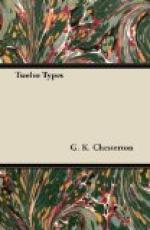Conceiving of St Francis as primarily the founder of the Franciscan Order, Mr Adderley opens his narrative with an admirable sketch of the history of Monasticism in Europe, which is certainly the best thing in the book. He distinguishes clearly and fairly between the Manichaean ideal that underlies so much of Eastern Monasticism and the ideal of self-discipline which never wholly vanished from the Christian form. But he does not throw any light on what must be for the outsider the absorbing problem of this Catholic asceticism, for the excellent reason that not being an outsider he does not find it a problem at all.
To most people, however, there is a fascinating inconsistency in the position of St Francis. He expressed in loftier and bolder language than any earthly thinker the conception that laughter is as divine as tears. He called his monks the mountebanks of God. He never forgot to take pleasure in a bird as it flashed past him, or a drop of water as it fell from his finger: he was, perhaps, the happiest of the sons of men. Yet this man undoubtedly founded his whole polity on the negation of what we think the most imperious necessities; in his three vows of poverty, chastity, and obedience, he denied to himself and those he loved most, property, love, and liberty. Why was it that the most large-hearted and poetic spirits in that age found their most congenial atmosphere in these awful renunciations? Why did he who loved where all men were blind, seek to blind himself where all men loved? Why was he a monk, and not a troubadour? These questions are far too large to be answered fully here, but in any life of Francis they ought at least to have been asked; we have a suspicion that if they were answered we should suddenly find that much of the enigma of this sullen time of ours was answered also. So it was with the monks. The two great parties in human affairs are only the party which sees life black against white, and the party which sees it white against black, the party which macerates and blackens itself with sacrifice because the background is full of the blaze of an universal mercy, and the party which crowns itself with flowers and lights itself with bridal torches because it stands against a black curtain of incalculable night. The revellers are old, and the monks are young. It was the monks who were the spendthrifts of happiness, and we who are its misers.
Doubtless, as is apparent from Mr Adderley’s book, the clear and tranquil life of the Three Vows had a fine and delicate effect on the genius of Francis. He was primarily a poet. The perfection of his literary instinct is shown in his naming the fire ‘brother,’ and the water ‘sister,’ in the quaint demagogic dexterity of the appeal in the sermon to the fishes ‘that they alone were saved in the Flood.’ In the amazingly minute and graphic dramatisation of the life, disappointments and excuses of any shrub or beast that he happened to be addressing, his genius has a curious resemblance to that of Burns. But if he avoided the weakness of Burns’ verses to animals, the occasional morbidity, bombast and moralisation on himself, the credit is surely due to a cleaner and more transparent life.




